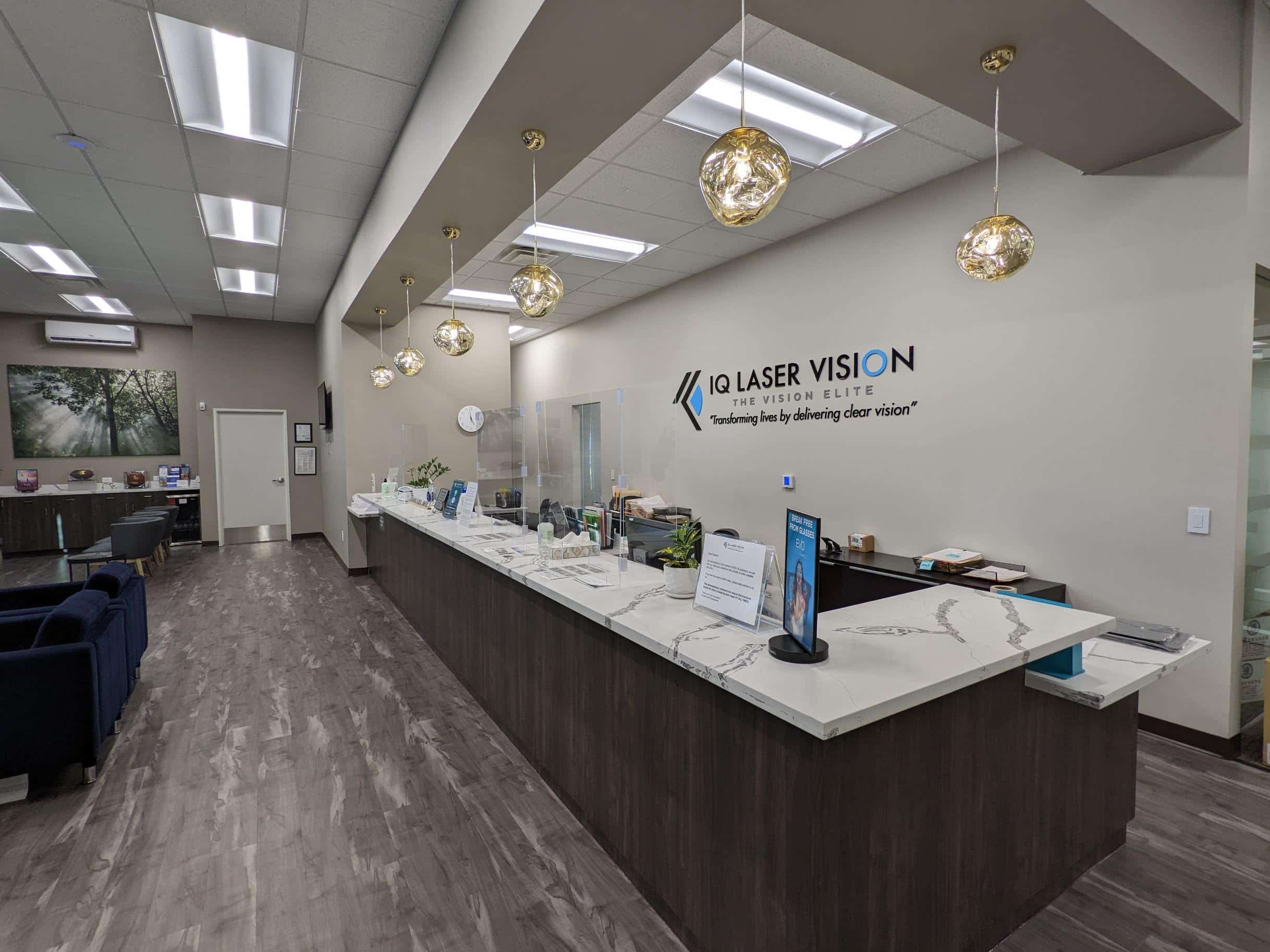When you’ve been providing laser eye surgery procedures for nearly two decades, you hear a lot of interesting questions. And as technological advances in ophthalmology increase, new procedures are gaining a following and raising a whole slew of questions. Thanks to social media and insta-fame, the word is spreading (along with a deep desire to stand out from the crowd). While there’s nothing wrong with wanting to be different, the fact is that some of the new procedures aren’t all they’re hyped up to be. They can even be downright dangerous. Such is the case with one of the latest trends: permanent eye color change surgery.
Cosmetic eye procedures like permanent eye color-change surgery have been gaining popularity of late. We’ve received many questions from people interested in modifying the color of their peepers. However, we don’t offer color-change procedures for some very good reasons that include a lack of FDA approval and high-rate of complications.
So what’s the deal with the trend of permanent eye color change surgery, and why can’t you find the procedure in the U.S.? Keep reading, because it could just save your vision.
The skinny on eye color
Eye color is determined by your genes. Brown, green and blue are the main eye colors, and there are a number of shades and hues within that, including grey and hazel. Brown is the most dominant color, and blue the most recessive, meaning that brown wins out the majority of the time.
Some color change occurs naturally. While our eye colors are determined by genetics, babies are usually born with blue eyes that may darken over the first few years of their lives as light stimulates the production of melanin. After that, your color is pretty much set for life, assuming you don’t get some risky procedure done that puts your vision in peril. However, some color change can occur due to illnesses. If eyes change from brown to green, or from blue to brown, it could indicate diseases like Horner’s syndrome, Fuchs heterochromic iridocyclitis, pigmentary glaucoma or iris melanoma. Any significant color changes should be immediately shared with your eye doctor.
The color-change surgery phenomenon
That said, there are two types of procedures that can achieve permanent eye color change. One utilizes silicone iris implants, and the other, a laser.
- Silicon Iris Implants This procedure was first developed using a metal implant as a way to amend iris-related abnormalities, like ocular albinism, in which a lack of pigment increases a person’s susceptibility to the harmful effects of the sun on the eyes. In the iris-implant surgery, colored implants are inserted into the iris to create the desired color. In the past, metallic iris implants were used, though they were found to increase the risk of chronic inflammation, glaucoma, and cataracts. They’ve been replaced by silicone implants. And while the silicone implants seem to be better tolerated, they still carry the same risks. While the procedure is currently offered in the U.S. for medical purposes, it’s not FDA approved for cosmetic use. This fact has driven people eager to change their eye color to countries such as Latin America or Africa for the surgery. However, the still-experimental surgery puts patients at great risk because the surgeons may or may not follow proper standards. Besides that, a track record of complications following the surgery could put patients at risk for vision loss. Side effects may take years to develop or might be seen immediately following the surgery. And they may just be irreversible.
- LaserA new laser procedure called Stroma is being clinically tested as a way of turning eyes from brown to blue. This laser is not related to the LASIK procedure at all. LASIK is FDA approved to change the shape of the cornea to help patients see better, and doesn’t affect eye color at all. It simply focuses on improving poor vision. However, the color-changing laser procedure Stroma has not yet been FDA approved for mass use. While the procedure seems simple enough, it’s already raising questions about the potential risks for causing more harm than good. Some of the potential risksthat have been brought up include ocular damage, inflammation from removing the naturally occurring pigment in the iris, greater sensitivity to light and glaucoma.
Neither surgery is approved for use in the U.S. for cosmetic purposes, leading many people to go overseas on a risky quest for their ideal eye color.
Check out part II to learn more about the dangers associated with eye color-change surgeries, real-life stories of post-surgery complications, and tips for better ways to beautify your eyes.
One study of a small sample of people showed that patients who underwent iris transplant surgery experienced some sort of complication, such as inflammation in the eyes, corneal swelling, corneal injury, cataracts, glaucoma or partial or complete blindness.
Numerous studies have shown a number of risks and complications associated with the iris-implant procedure. According to the American Academy of Ophthalmology, one study showed that 9 of 14 patients ended up needing to remove their implants due to complications. And while patients using it for medical rather than cosmetic purposes are also at risk of these complications, these complications often pale in comparison to the issues patients faced before surgery.
The complications could include:
- Pressure buildup in the eye (which could lead to glaucoma)
- Cataract clouding of the lens
- Eye infection requiring removal of the eye
- Corneal scratches, scarring or inflammation
- Iris inflammation that could result in pain, tearing or blurry vision
- Low vision or blindness
There are many stories meant as warnings against seeking out permanent eye color change surgeries for cosmetic purposes. Here’s a quick look at the people, the complications, and their thoughts on the procedures.
Stories Of Color Change Surgery Gone Wrong
Nadinne Bruna: Instagram Model, Nadinne Bruna, went partially blind after undergoing a cosmetic eye color surgery in Colombia. After the surgery to change her healthy eyes from hazel to light grey with silicone implants. She realized she’d made a big mistake. The irreparable damage left her with 80% vision loss in one eye and 50% in the other.
Shenise Farrell: Londoner Shenise Farrell traveled to Panama for an iris-implant procedure. To change her eyes from dark brown to light brown. Following the procedure, she was left with partial vision loss. When she opened her eyes, everything was blurry. Her eyesight continued to decline when she returned home. Forcing her to undergo surgery again to remove the implants to avoid permanent vision loss.
Unnamed American woman: Another story recalls an American woman who traveled to Latin America to achieve her blue eyes only to be left with vision loss, malformed pupil and iris tissue damage.
Tiny Harris: Though reality-tv celebrity Tiny Harris reported happiness with her results following the iris-implant surgery, she later reported that the long-term results weren’t the best.
Read additional stories of patients who suffered complications from the dangerous surgery here.
A Warning To Those Who See This Trend
While some companies are trying to gain FDA approval for the procedure for cosmetic purposes, we’re dubious that it will be given because of the many reported complications, and the riskiness associated with the procedure. We highly recommend that people talk to their ophthalmologist before making any decisions that could put their vision at risk.
While ophthalmologists will highly encourage their patients to avoid cosmetic eye color changes, they aren’t the only ones against it. The American Academy of Ophthalmology, the Contact Lens Association of Ophthalmologists and the American Glaucoma Society also recommend patients avoid this course to save their vision.
Don’t chase down some hyped up procedures that aren’t approved in the U.S. as safe. There might just be a reason why it hasn’t been approved, and we’d hate for you to find out the devastating way. Permanent vision loss is not something to play around with. Strong, healthy eyesight is important for being able to live everyday to its fullest. And choosing to have a known, high-risk procedure for cosmetic reasons just doesn’t make sense.
A simple, safe FDA-approved way to bring out the natural beauty of your eyes
If you want to optimize the look of your eyes, there are FDA-approved procedures to enhance the natural beauty. Your eyes are the windows to your deepest self, and by removing barriers, like glasses, you can create a whole new world between others and yourself.
If you have questions about cosmetic procedures for your eyes, talk to your eye care professional. The FDA oversees procedures like LASIK and SMILE to improve vision. The FDA has also recently given pre-approval for SMILE as a treatment for astigmatism.
Have questions or want to book a consultation? Give our internationally-known team a call at (888) 539-2211, or book online here.























